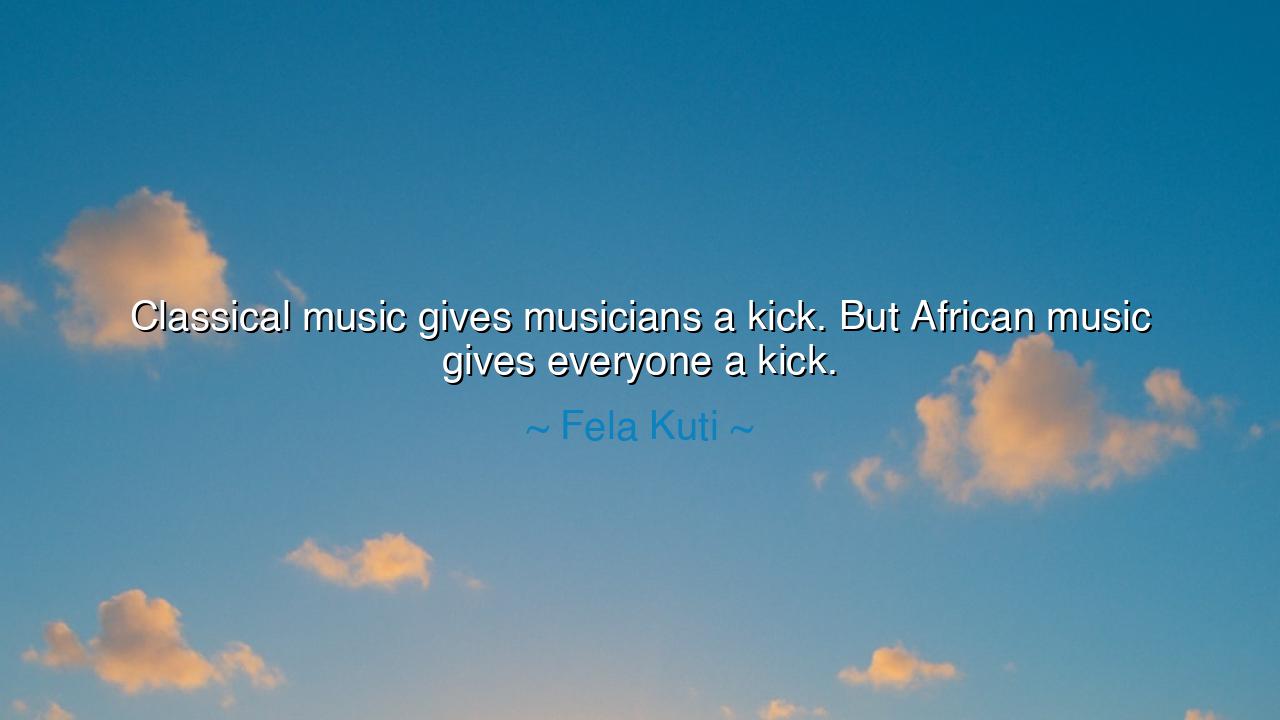
Classical music gives musicians a kick. But African music gives






When the fiery prophet of sound, Fela Kuti, declared, “Classical music gives musicians a kick. But African music gives everyone a kick,” he was not dismissing one tradition, but lifting up another—the music of the people, the music of the earth, the music that belongs not to the trained elite but to every soul that walks, breathes, and dances. His words cut to the heart of what music truly is: not only an art for study, but a force of life, a rhythm that unites body and spirit, accessible to all without boundary or privilege.
The ancients themselves knew this power of rhythm. In Africa, the drum was never a mere instrument but a voice, carrying messages across villages, summoning people to gather, calling warriors to battle, and guiding the spirit into communion with the divine. Its beat was primal, older than kings, older than temples, the very echo of the human heart. This is what Fela meant when he said African music gives “everyone a kick”—its power is universal, its rhythm irresistible. Even the child and the elder, the farmer and the scholar, the foreigner and the native, all feel its pulse.
By contrast, classical music, as Fela observed, demands training, discipline, and a cultivated ear. Its beauty is vast, and its glory undeniable, yet its reach is often confined to those who can interpret its codes. To play Bach, one must practice; to grasp Mozart, one must learn. Thus, classical music often gives its “kick” to the musician or the educated listener, those who can climb its lofty walls. But African music bursts through walls, spreading its energy to all, needing no explanation, no translation—only the human body that cannot help but move.
Consider the story of Fela Kuti himself, who fused jazz, funk, and traditional African rhythms into Afrobeat, a music that electrified not only Nigeria but the world. His concerts were more than performances—they were uprisings of spirit, gatherings where thousands danced as one body, forgetting divisions of class, tribe, or tongue. Through rhythm, Fela brought unity, power, and rebellion. His music was proof of his own words: it gave “everyone a kick,” lifting hearts and stirring courage against oppression.
History gives us more witnesses to this truth. In the days of slavery in the Americas, African rhythms survived in secret, carried in song and dance. The enslaved, though broken in body, were kept alive in spirit by music. These rhythms later gave birth to blues, jazz, gospel, and ultimately rock, reggae, hip-hop—genres that moved not only Africans but the entire world. This is the heritage Fela proclaimed: African music is not just for Africa—it is the root of much of the world’s joy, rebellion, and soul.
The meaning of his words is therefore profound: music that lives only in the mind may touch a few, but music that lives in the body and spirit touches all. African music carries the gift of immediacy—it does not ask for permission or knowledge; it seizes the heart and commands the feet. It is democratic, universal, and eternal. It gives a “kick” not to the privileged, but to all who are alive.
The lesson for us is this: honor the rhythms that unite rather than divide. Let music not only be studied, but lived. Listen not only with your ears, but with your body and soul. Seek out the traditions of your ancestors, for in their songs lies the power to heal, to awaken, and to connect. And when you create, aim not only for the applause of experts, but for the heartbeat of the people.
Therefore, let us remember Fela Kuti’s words as a commandment: “Classical music gives musicians a kick. But African music gives everyone a kick.” One is the art of mastery, the other the art of life. And while mastery is noble, it is life itself that sustains us. Let us choose music that moves all, uniting nations in rhythm, reminding us that beneath every difference, we share the same pulse, the same heartbeat, the same eternal song.






AAdministratorAdministrator
Welcome, honored guests. Please leave a comment, we will respond soon